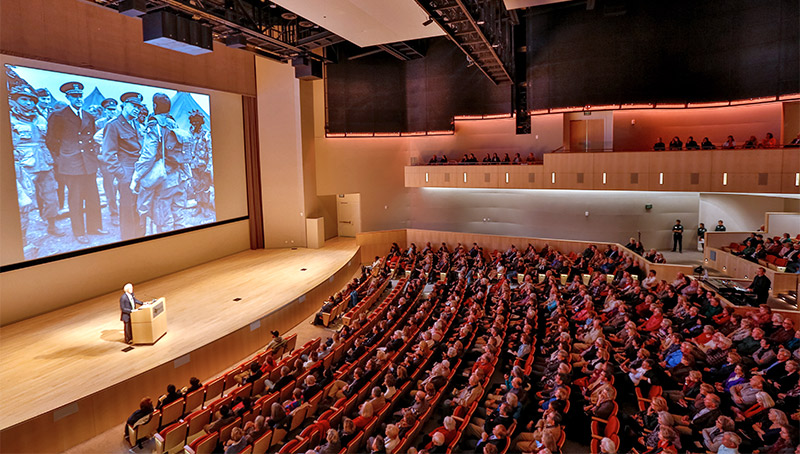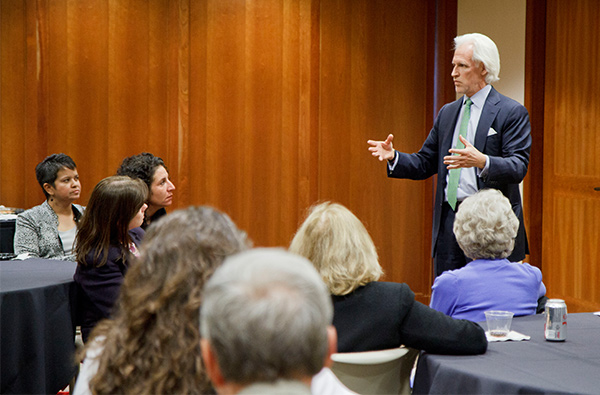
Author Robert Edsel was the first speaker in the ATEC Distinguished Lecture Series on Jan. 22.
Robert Edsel was living in Florence, Italy, when he took the first steps toward discovering a cause that would drive the next 15 years of his life.
Before a sold-out audience of 1,200 people in the new Edith O’Donnell Arts and Technology Building at UT Dallas, Edsel recently described his journey through time, history and heroism in the rescue of thousands of art treasures.
Tickets
Tickets are still available for Christian Belady’s appearance, as well as the rest of the series, including talks by Vinton G. Cerf, a “father of the Internet,” on March 26; and scientist and astronaut Mae Jemison on April 16.
Tickets are $15 for seats on the lower level of the lecture hall and $10 for the upper level. A limited number of complimentary tickets are available for students, faculty and staff who register.
He explained how his curiosity led him to a previously untold story about American volunteers during World War II who tracked and retrieved artworks stolen by the Nazi war machine. Edsel documented their plight in his book The Monuments Men: Allied Heroes, Nazi Thieves and the Greatest Treasure Hunt in History. During his talk, he showed clips from actor and director George Clooney’s movie, The Monuments Men, which is based on the book and is set to premiere in February.
Edsel was the first speaker in the new ATEC Distinguished Lecture Series. The series is designed to illuminate the concepts behind the merger of art and technology and to serve as a creative spark for the North Texas region.
Tickets are still available for the rest of the series, including appearances by tech executive and UT Dallas alumnus Christian Belady on Feb. 26 (see sidebar); Vinton G. Cerf, a “father of the Internet,” on March 26; and scientist and astronaut Mae Jemison on April 16. All of the lectures begin at 7 p.m.
During his visit to campus, Edsel also met privately with students and faculty from the School of Arts and Humanities and from the Ackerman Center for Holocaust Studies. Over doughnuts and coffee, students asked detailed questions about the Monuments Men.

Edsel met privately before his lecture with students and faculty.
“It was remarkable to hear about the noble cause of soldiers, who were art lovers, and were charged with saving cultural treasures stolen by the Nazis rather than destroying it,” said Sarah Valente, a PhD student and Belofsky Graduate Fellow from the Ackerman Center. “Stories like this are very rare, so it is always compelling to hear a story of redemption, of soldiers putting their lives on the line to save art, trying to recover what was lost, and being able to locate objects and saving them for generations to come.”
During a private reception, Edsel said he hoped the film will “shake the snow globe of questions on cultural property, ownership, restitution issues, the museums’ responsibilities and international law” and that it helps to preserve the legacy of the Monuments Men.